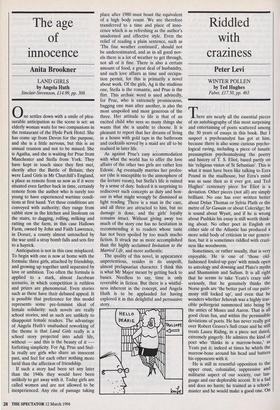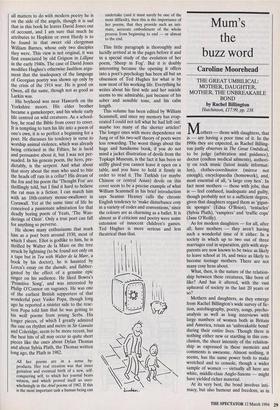Riddled with craziness
Peter Levi
WINTER POLLEN by Ted Hughes Faber, f17.50, pp. 465 There are nearly all the essential pieces of an autobiography of this most surprising and entertaining of poets scattered among the 30 years of essays in this book. But I suspect a psychoanalyst has got at him, because there is also some curious psycho- logical raving, including a piece of lunatic presumption psychoanalysing the poetry and history of T. S. Eliot, based partly on his 'religious vision of St Sebastian'. This is what it must have been like talking to Ezra Pound in the madhouse, but Ezra's mind was as sane then as it ever got, and Ted Hughes' centenary piece for Eliot is a deviation. Other pieces (not all) are simply brilliant. No one has ever written better about Dylan Thomas or Sylvia Plath or the metre of Sir Gawain or about Coleridge; he is sound about Wyatt, and if he is wrong about Pushkin his essay is still worth think- ing about. No other poet in English on either side of the Atlantic has produced a more solid body of criticism in our genera- tion, but it is sometimes riddled with crazi- ness like woodworm.
Sometimes, or rather usually, that is very enjoyable. He is one of 'those old- fashioned fouled-up guys' with minds open to astrology and dowsing and Plato's myths and Shamanism and Sufism. It is all right that he seems to take Yeats's crazy side seriously, that he genuinely thinks the Norse gods are `the better part of our patri- mony still locked up', and even that he wonders whether Jehovah was a highly iras- cible poltergeist summoned into being by the antics of Moses and Aaron. That is all good clean fun, and within the permissible deviations of poets. He has never really got over Robert Graves's Sufi craze and he still treats Laura Riding, in a piece not dated, extremely gingerly. He admires the kind of poet who 'thinks in a marrow-bone,' as Yeats put it; indeed at times he whirls the marrow-bone around his head and batters his opponents with it.
He is still in resentful opposition to the upper crust, colonialist, suppressive and militarist aspect of our society, our lan- guage and our deplorable accent. It is a fad and does no harm; he trained as a school- master and he would make a good one. On all matters to do with modern poetry he is on the side of the angels, though it is sad that in this book he leaves David Jones out of account, and I am sure that much he attributes to Hopkins or even Hardy is to be found in that sweet old clergyman William Barnes, whose only two disciples they were. This view is not original, it was first enunciated by old Grigson in Lilliput in the early 1940s. The case of David Jones modifies Hughes's otherwise faultless argu- ment that the inadequacy of the language of Georgian poetry was shown up only by the crisis of the 1914 war. He is good on Owen, all the same, though not as good as Larkin was.
His boyhood was near Haworth on the Yorkshire moors. His elder brother became a gamekeeper, and his whole early life centred on wild creatures. As a school- boy, he read the Bible from cover to cover. It is tempting to turn his life into a poem of one's own, it is so perfect a beginning for a poet. He discusses his tendency in verse to worship animal violence, which was already being criticised in the Fifties; he is lucid and persuasive about it, but I was not per- suaded. In his genesis poem, the hero, pre- dictably, is the serpent. And what about that story about the man who used to bite the heads off rats in a cellar? His dream of the fox and his poem the 'Thought Fox' are thrillingly told, but I find it hard to believe the rat man is a fiction. I can match him with an 18th-century mouse-swallower in Cornwall. Yet at the same time of life he conceived a passionate admiration for that deadly boring poem of Yeats, 'The Wan- derings of Oisin'. Only a true poet can fall for anything so perverse. He shows many enthusiasms that mark him as a poet born around 1930, most of which I share. Eliot is godlike to him, he is thrilled by Walter de la Mare on the tree struck by lightning (to be found not only on a tape but in Tea with Walter de la Mare, a book by his doctor), he is haunted by Lorca's essay on the duende, and flabber- gasted by the effect of a genuine epic singer on his audience. He liked Bowra's `Primitive Song', and was interested by Philip O'Connor on vagrancy. He was one of the earliest British supporters of that wonderful poet Vasko Popa, though long ago he reported a sinister side to the reac- tion Popa told him that he was getting to his wolf poems from young Serbs. His longer pieces, of which I greatly admired the one on rhythm and metre in Sir Gawain and Coleridge, seem to be more recent, but the best bits of all may occur in quite short pieces like the ones about Dylan Thomas and about Sylvia Plath, the Thomas written long ago, the Plath in 1982.
All her poems are in a sense by- products. Her real creation was that inner gestation and eventual birth of a new, self- conquering self, to which her journal bears witness, and which proved itself so over- whelmingly in the Ariel poems of 1962. If this is the most important task a human being can
undertake (and it must surely be one of the most difficult), then this is the importance of her poems, that they provide such an inti- mate, accurate embodiment of the whole process from beginning to end — or almost to the end.
This little paragraph is thoroughly and lucidly arrived at in the pages before it and in a special study of the evolution of her poem, 'Sheep in Fog'. But it is doubly interesting because the opening it offers into a poet's psychology has been all but an obsession of Ted Hughes for what is by now most of his working life. Everything he writes about his first wife and her suicide seems to me admirable, just because of his sober and sensible tone, and his calm length.
This volume has been edited by William Scammell, and since my memory has evap- orated I could not tell what he had left out: maybe too many of the shorter articles? The longer ones with more dependence on Jung or of his two-self theory of poets were less rewarding. The worst things about the huge and handsome book, if you do not mind a jacket illustration of devils from the Topkapi Museum, is the fact it has been so stiffly glued you cannot leave it open on a table, and you have to hold it firmly in order to read it. The Turkish (or maybe Chinese or central Asian) devils on this cover seem to be a precise example of what William Scammell in his brief introduction says Seamus Heaney calls the chronic English tendency to 'make disturbance cosy in a variety of codes and conventions,' since the colours are as charming as a ballet. It is almost as if criticism and poetry were some extension of innocent children's games. Ted Hughes is more serious and less theatrical than that.



















































 Previous page
Previous page